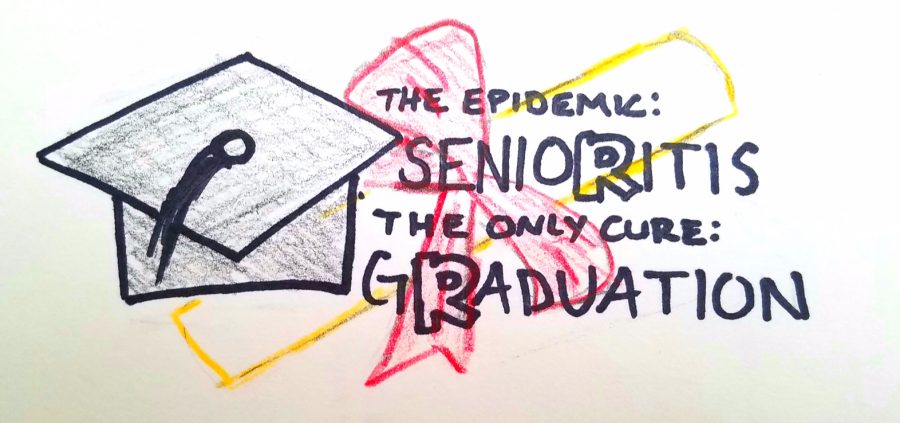Is it the Mumps? The Measles? Oh No, it’s Senioritis!
April 7, 2017
Grades drop like flies and students shrug in the face of mystified, frustrated adults—call it what you want: it’s apathy, it’s senioritis.
Like clockwork, the arrival of second semester aligns with a dip in senior grades. Some students suffer from mild senioritis, where an “A-” differs little from a “B+.” But serious senioritis, when “A” students become “C” students, can trigger warnings of academic probation and rescinded acceptances—even financial aid can be affected by senioritis [1]. As teachers and parents warn constantly, serious senioritis is not without consequence.
Yet, what motivates students to eschew the serious consequences?
Ashley Yang, ’17, offers her perspective: “It’s as if our high school careers are built towards that pinnacle of college applications and that hopeful, eventual acceptance… When there is no driving factor to do work (for grades and college or for the love and sake of learning), then senioritis happens.”
A lack of purpose seems to haunt second semester seniors, who, for years, have ridden the hamster wheel of endless tests and homework. It’s no secret: high schools and colleges incentivize students to master material mechanically, causing undue stress. The Washington Post’s Jay Matthews agrees that “once you’re in the habit of treating every assignment as critical to your future, it’s hard to regain perspective” [2]. Additionally, most high school curriculums emphasize testing, offering little creative opportunities and hands-on assignments. Students have little incentive to sustain such high achievement if not engaged by what they’re learning.
Serious senioritis is not recommended: a failing second semester report card can still endanger acceptance. But rather than treating senioritis as a sickly disease, parents and students should embrace second semester as an opportunity for unconventional learning. As Shreyes Manivel, ’17 recommends, “This time can be a source of intellectual exploration, absent from the pressure of grades.” Students who might otherwise be discouraged by the normal academic grind can instead thrive and take healthy risks.
For many students, second semester also offers balance. Tommy Martinson, ’17, adds, “What caused senioritis, for me at least, is the knowledge that grades don’t matter [as much] anymore, and the desire to finally focus more on my social life, which has been more or less neglected for the past three years.”
Second semester could be an opportunity, a chance for seniors to pursue learning for its own sake. If possible, seniors should find new activities that spark interest and curiosity. Teachers could emphasize less testing and incorporate field trips and engaging discussions. The cure to senioritis lies in the need to recapture the importance of exploration and the need for balance.
[1] http://www.huffingtonpost.com/kat-cohen/truth-about-senioritis_b_9040680.html
[2] http://www.washingtonpost.com/wp-dyn/content/article/2009/05/17/AR2009051701883.html

